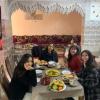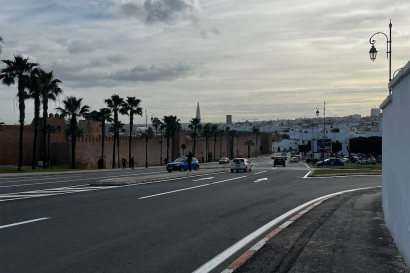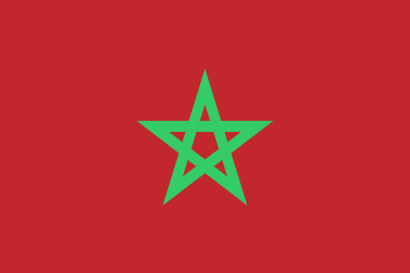It’s the last weekend of my program, and as I take the train from Rabat to Marrakech, I feel heavy with memories of my time in such a magnificent country. The landscape around me turns slowly from the lush greens of Casablanca to the cool beiges of the desert caused by the rain shadow of the Atlas Mountains. It’s hard to believe how nonchalant taking a cross-country Moroccan train feels now, compared to the fresh-faced me that appeared in the Rabat airport just four months ago.
The cliche we always hear, the study-abroad-changed-me cliche, I hate to say it, I really do, but I can’t help but believe it might be true. Being thrust into a different culture so deeply changes how I can interact with the world and the depth at which I reach understanding. Not only have I learned how to live within a different culture, I know so much more about how one can appreciate it, cherish it, and be respectful within it. I feel a deeper understanding of cultures not my own, not Moroccan, and a deeper desire to understand it all.
But on a more superficial level, I’m going to miss every part of living in Rabat. The five-minute walk to the beach, slipping on my sandals after class and being met with such breathtaking beauty without even breaking a sweat. Every morning waking in a stunning Riad finished with wood carvings and lovely tilework, every evening getting to enjoy handmade food in a multigenerational household, warm with love. My walk to school, past the ancient L’Oudaya Kasbah, a 14th-century fortress, its high stone walls and gigantic keyhole doors now as commonplace as the medina cats that mew at me as I walk.
I surprise myself every day with how much I’ve learned. Now, in coffee shops, darija, the colloquial Moroccan Arabic, comes as easily, if not easier, than French. English is a distant memory. Shopkeeps greet me on my walk to school, a labas, a kulshi myzian? to remind me that despite my foreign nature, I have become a part of this community. I still feel the flutter of excitement when I pass someone I know on the street and they greet me with a kind salam alakum. I feel known. The city, while the capital, feels as small as any town where neighbors deign to lock their doors and share conversations while they hang their laundry.
At sunset, I’ll receive a text to come to the rocks by the beach, to bring some haliwayat- Moroccan sweets- and I’ll sit by my friends, we’ll feel the sea spray, we’ll talk, we’ll watch the sun sink slowly past the lighthouse that perches itself at the end of our little stretch of sand. It doesn’t seem fair that I could be thrown into so much beauty so suddenly, sprawling markets, ancient towers, murals and hand-woven rugs and yards of yards of colorful fabrics shining in the sun as I skip past them to the juice stands with the freshly squeezed everything and take it all in, just for a moment, before heading home.






Zoe Carver
Zoe Carver is a second-year student of International Affairs and Peace Studies at the George Washington University, minoring in French and Creative Writing. She is originally from Portland, Oregon and is apart of GW's Literary Magazine, Model UN team, and Student Climate Coalition. She just finished a positon interning in the United States Senate, and has a deep love for crocheting.













